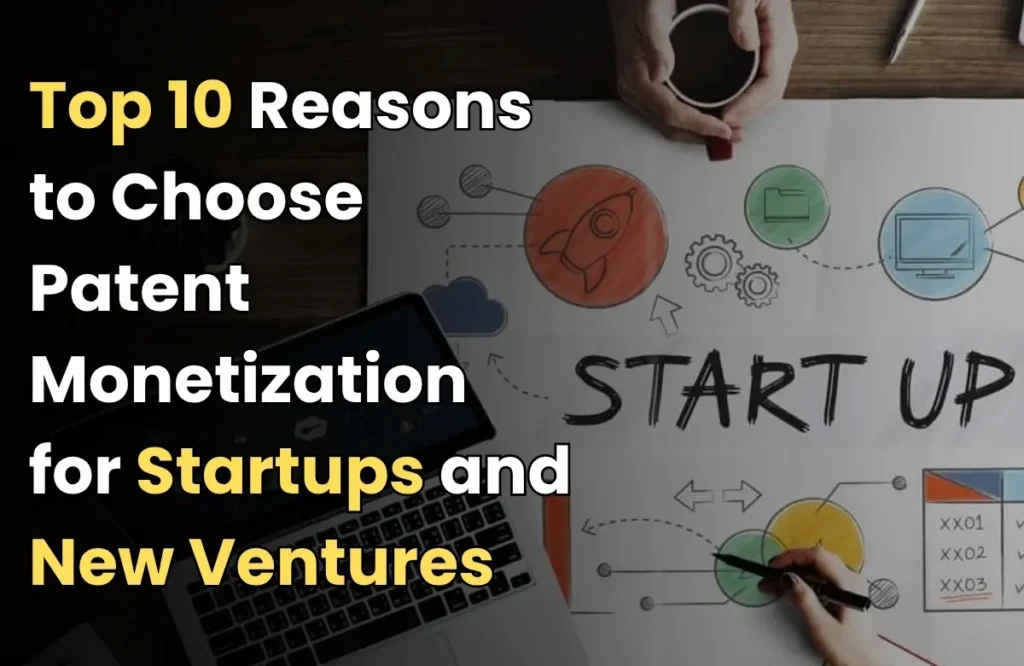
Patent monetization is the process of turning a patent into a source of revenue or profit. It allows inventors, businesses, and especially startups to generate income from their intellectual property without necessarily producing or selling a physical product. In this blog you can read about Reasons to choose Patent Monetization for Startups. In particular, often face financial challenges when it comes to expanding operations, investing in R&D, or launching new products. At the same time, they are among the most innovative players, holding patents with tremendous potential value. By monetizing these patents, startups can unlock much-needed capital to grow and stay competitive in the market. Keep reading to discover the top 10 reasons to choose patent monetization for startups.
Why Startups Need Patent Monetization for Growth and Innovation
To understand the concept of patent monetization, it’s important to first see why startups need it. Patent monetization comes with several major advantages for young and growing businesses. It helps generate extra income from existing patents and improves cash flow without requiring startups to sell their equity. By monetizing patents, companies can increase their valuation, attract investors, and reduce financial risks. It also encourages innovation, strengthens brand credibility, and opens doors to partnerships and collaborations. Most importantly, it enables startups to protect their technology while creating a sustainable, long-term source of revenue from their intellectual property. For startups, this strategy works especially well because:
- They often struggle with funding during their early stages.
- Developing new products, hiring skilled teams, or expanding into new markets all demand significant capital.
- It also boosts investor confidence, as monetized patents show a company’s ability to turn innovation into real business value.
- Beyond the financial benefits, patent monetization allows startups to focus on innovation, while their intellectual property quietly works as a reliable revenue engine in the background.
This is where patent monetization for startups becomes a game-changer. By patent monetization, startups can generate steady income or raise immediate funds without giving up ownership or control.
What Are the Best Strategies Startups Can Use to Monetize Their Patents?
There are many practical ways startups can turn their patents into income or business growth opportunities with the help of the patent monetization process.
- Licensing the Patent: Startups can give other companies permission to use their patented technology in return for a royalty or fee. It’s one of the easiest ways to make steady money while still keeping ownership of the patent.
- Selling the Patent: If managing the patent feels difficult or expensive, startups can sell it completely to another company for a one-time payment. This helps bring in quick funds that can be used for product development or scaling up.
- Cross-Licensing Deals: In this approach, two or more businesses agree to share access to each other’s patents. This helps startups use new technologies, avoid legal issues, and build strong relationships with larger companies.
- Partnerships and Collaborations: Startups can team up with bigger companies to develop or market their patented technology. These collaborations can lead to profit-sharing, exposure in new markets, and faster business growth.
These strategies help startups turn their innovations into real business value. Whether it’s through licensing, selling, or partnerships, patent monetization gives startups the financial boost and flexibility they need to grow faster and stay competitive.
Conclusion
In today’s competitive startup world, patent monetization isn’t just an option — it’s a smart business move. It allows startups to turn innovation into income source, attract investors, and strengthen their market position. By using the right strategies like patent licensing, selling, or partnerships, startups can make the most of their ideas while securing long-term growth and financial stability.









